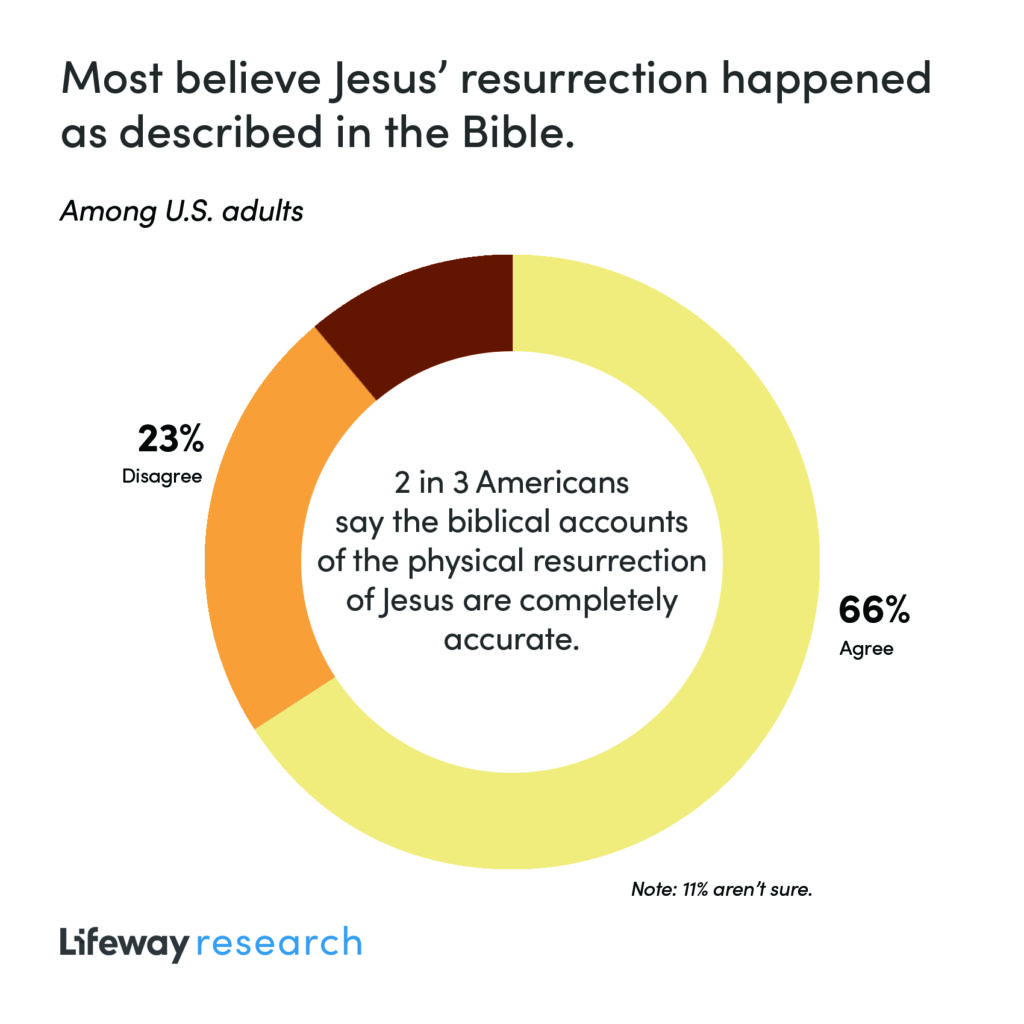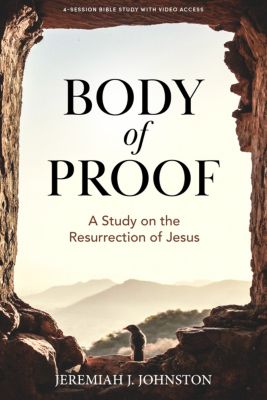
The truthfulness of Jesus’ resurrection should challenge skeptics and bring life-changing hope and comfort to every Christian.
By Aaron Earls
As churches gather to proclaim the good news of Easter, they do so in a culture filled with skeptics and cynics. Some don’t believe Jesus was crucified, buried, and resurrected to new life. Others accept that it happened but don’t believe it matters in their daily lives.
Amid that reality, Jeremiah Johnston, author of Body of Proof: A Study on the Resurrection of Jesus, challenges pastors and churches to focus even more on the resurrection to help doubters see the validity of the historical event and to encourage believers to trust in the hope provided by the new life granted through the resurrection.
The resurrection is true
According to Lifeway Research’s 2022 State of the Theology study, around 1 in 3 Americans doubt the biblical accounts of Jesus’ physical resurrection, including 23% who say they are false. Most people who deny the resurrection do so because of the “utter uniqueness of the claim,” says Johnston, who also serves as the pastor of apologetics and cultural engagement at Prestonwood Baptist Church in Plano, Texas.

Skeptics simply doubt that a man can be dead for several days and come back to life. He says they also frequently claim “the historical evidence itself is weak, there were no witnesses of the event, or the New Testament writings that report the resurrection are not credible.”
Some try to argue that Jesus isn’t a historical figure, but Johnston says, “There is a great deal of evidence for Jesus, both for his public life and his public execution. Only the Roman emperors themselves are better attested in history.”
“There is a great deal of evidence for Jesus, both for his public life and his public execution. Only the Roman emperors themselves are better attested in history.” — @_jeremiahj Click To TweetHe says almost all historians concede many of the New Testament claims about Jesus, including that His followers proclaimed He was resurrected and began living differently within a short time after His death. Most can also agree the disciples had experiences of seeing Jesus after His death.
Skeptics have offered alternative explanations for the biblical accounts—for example, that Jesus didn’t actually die on the cross or His followers accidentally went to the wrong tomb. But most of these theories have no following today, and each has apologetic responses that demonstrate the shortcomings of the claims. “Christians believe the actual resurrection of Jesus is the best explanation for the historical givens,” Johnston says. “Our faith is based in historical fact.”
The resurrection is important
While 66% of Americans say the biblical accounts of Jesus’ resurrection are accurate, fewer (47%) strongly agree. Even among those who regularly attend church, just 71% strongly agree. Johnston says the relative lack of strength of belief in the resurrection is an unfortunate byproduct of the lack of emphasis churches place on it. He says the resurrection is “under-lived because it is under-preached and under-studied by most pastors.”
Johnston says the resurrection is central to what it means to be a Christian. “You cannot be a follower of Jesus if you deny the historical, physical, bodily resurrection of Jesus Christ,” he said. “I am surprised at how controversial this answer has been in modern media.”
“You cannot be a follower of Jesus if you deny the historical, physical, bodily resurrection of Jesus Christ.” — @_jeremiahj Click To TweetFor the early church, Johnston says a belief in the resurrection “was no mere footnote but rather a focal point. Every Sunday was resurrection Sunday.” Flowing out from this, he notes “Jesus’ resurrection is a central focus of our New Testament Scripture with over 300 verses referencing this truth. When we study what the Bible teaches about the resurrection of Jesus, we are struck by the power this singular historical event had on the early followers of Jesus.”
Examining the New Testament church, Johnston says we see how a belief in the resurrection “empowered them to ‘[turn] the world upside down’ (Acts 17:6).” He also says their resurrection faith was key to their ethics (1 Corinthians 15:58-16:1), brought hope in moments of worldly despair (2 Corinthians 1:3-11), and caused the earliest followers of Jesus to become the greatest force for God on earth (Galatians 3:28). “These truths and promises are fuel to our faiths’ fire,” he says.
Above everything else, the reality of the resurrection should grant Christians hope, Johnston says, noting the word appears over 100 times in the New Testament. “Jesus Christ shattered the gates of death for us and now reins as our living Lord. He is alive,” Johnston says. “We are, right now, alive with Him (Colossians 3:1-4).”
“Jesus Christ shattered the gates of death for us and now reins as our living Lord. He is alive. We are, right now, alive with Him (Colossians 3:1-4).” — @_jeremiahj Click To TweetFor Johnston, this should change Christians’ perspective. “Our living hope is based on the historical, unchangeable fact of Jesus’ physical, bodily resurrection from the dead,” he says. “The Bible teaches us that in the resurrected Christ we have a ‘living hope’ (1 Peter 1:3), a ‘better hope’ (Hebrews 7:19), and a ‘sure’ hope (Hebrews 6:19).”
For permission to republish this article, contact Marissa Postell Sullivan.













